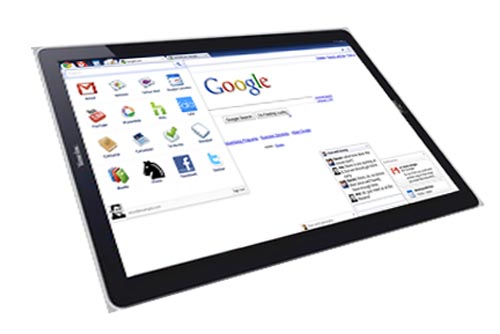Why Chrome OS tablets are a bad idea
 A couple days ago, Aaron wrote an interesting piece on how some new screen rotation features in dev builds of Chrome OS might indicate plans for a Chrome OS tablet. While an interesting proposition, and one that many might like to see, I find it doubtful that it will be happening any time soon – and here’s why.
A couple days ago, Aaron wrote an interesting piece on how some new screen rotation features in dev builds of Chrome OS might indicate plans for a Chrome OS tablet. While an interesting proposition, and one that many might like to see, I find it doubtful that it will be happening any time soon – and here’s why.
There are lots of uses for screen rotation, other than just tablets.
One area that Chrome developers have been working very hard on improving is external and multi-monitor support. Many monitors can swivel, face any direction you want them to, and can even – yes – be flipped over on their sides. Until now, Chrome OS had no way of ensuring proper output to these monitors, but now it does.
Additionally, computer manufacturers like Lenovo have proven that really novel laptop designs can be popular among consumers. Look at the Lenovo ThinkPad Twist, or the Lenovo IdeaPad Yoga. If Chrome OS were to exist on a device like one of these – both of which are definitely not tablets – the need for screen rotation becomes more apparent.
Additionally, consider this: Acer basically took one of its existing Windows laptop designs, and threw Chrome OS onto it. Thus, we have the Acer C7 Chromebook. Lenovo already built one Chromebook, so it’s not beyond the realm of possibility that we might see a Chromebook Yoga sometime in the near future, based on the existing hardware.
Chrome OS is still a little too premature for a touch-only interface.
The Chromebook Pixel has proven that touch can work on Chrome OS – but it’s still very limited in its usefulness and practical applications. This might all change very soon at Google I/O, of course, but as it stands now, I don’t think the OS would be enjoyable to use on a tablet without the option of a keyboard and trackpad. It’s just not there quite yet, but we’re getting closer.
Why would Google canibalize its own tablet sales?
Many people argue that it’s confusing for consumers that Google has two OSes. I call bull, because Apple has two (OS X for the desktop, and iOS for mobile). Microsoft also has two (Windows for the desktop, and Windows Phone for mobile). Why can’t Google have two (Chrome OS for the desktop, Android for mobile)?
To me, it would make less sense for Google to have two separate OSes running on the same kind of device. If both Chrome and Android tablets existed side by side, that’s when the real confusion would set it. Plus, with Android tablets selling so well, why would Google want to do anything to jeopardize that?
Like I said, my entire perspective on this might change once I hear more from Google I/O. But as of now, based on what I know, a Chrome OS tablet seems unlikely – even with this new screen rotation feature. What do you think?


